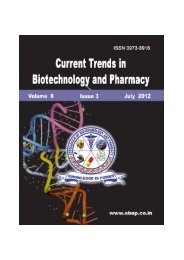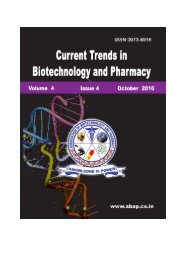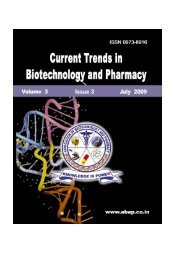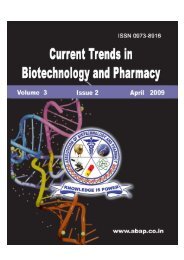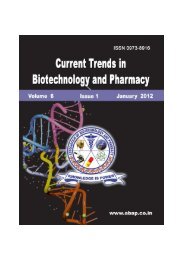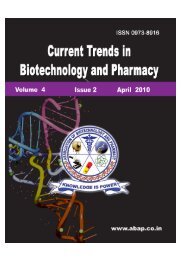d(GC) - Association of Biotechnology and Pharmacy
d(GC) - Association of Biotechnology and Pharmacy
d(GC) - Association of Biotechnology and Pharmacy
Create successful ePaper yourself
Turn your PDF publications into a flip-book with our unique Google optimized e-Paper software.
Current Trends in <strong>Biotechnology</strong> <strong>and</strong> <strong>Pharmacy</strong><br />
Vol. 6 (2) 119-144 April 2012, ISSN 0973-8916 (Print), 2230-7303 (Online)<br />
suspected, genetic counseling <strong>and</strong> further testing<br />
is then recommended, according to guidelines,<br />
for the index case <strong>and</strong> asymptomatic family<br />
members (40).<br />
FAP is another autosomal dominant<br />
disorder characterized by numerous<br />
adenomatous colorectal polyps with a tendency<br />
to form adenocarcinoma; penetrance by 40 years<br />
<strong>of</strong> age is almost complete (38, 55). Clinical<br />
variations on FAP include attenuated FAP,<br />
Gardner <strong>and</strong> Turcot syndromes, but all forms are<br />
associated with germline mutations in APC (55).<br />
FAP is responsible for less than 1% <strong>of</strong> colorectal<br />
cancer cases <strong>and</strong> 25-50% <strong>of</strong> FAP individuals will<br />
have de novo APC mutations with no family<br />
history <strong>of</strong> the condition, with 20% <strong>of</strong> these patients<br />
also showing somatic mosacism (38, 41).<br />
Nonetheless, there is value in the genetic<br />
screening <strong>of</strong> families <strong>of</strong> index cases as<br />
prophylactic endoscopic screening, initiated<br />
before 20 years <strong>of</strong> age, <strong>and</strong> prophylactic<br />
colectomy strongly reduces risk <strong>of</strong> colorectal<br />
cancer (38, 41).<br />
APC is a gene <strong>of</strong> 160kb with up to 21 exons<br />
<strong>and</strong> many alternative transcripts (38, 56).<br />
Polakis et al. (57) provides a summary <strong>of</strong> the<br />
somatic <strong>and</strong> germline mutations common in APC<br />
<strong>and</strong> a database <strong>of</strong> mutations <strong>and</strong> polymorphisms<br />
in APC is maintained by the International Society<br />
for Gastrointestinal Hereditary Tumours (58).<br />
(This database also tracks mutations <strong>and</strong><br />
polymorphisms in HNPCC-associated genes.)<br />
Correlations exist between the location <strong>of</strong> these<br />
mutations in APC <strong>and</strong> the clinical presentation<br />
<strong>of</strong> FAP (55).<br />
The second main application <strong>of</strong><br />
personalized medicine in managing colon cancer<br />
is typing <strong>of</strong> colorectal tumors to improve<br />
therapeutic choice. A number <strong>of</strong> examples exist<br />
where genetic testing <strong>of</strong> tumors will guide drug<br />
use.<br />
First-line chemotherapies for colon cancer<br />
include fluoropyrimidines (5-fluorouracil (5-FU)<br />
<strong>and</strong> capecitabine, the prodrug <strong>of</strong> 5-FU),<br />
oxaliplatin <strong>and</strong> irinotecan (59). 5-FU is<br />
Rebecca E. Smith <strong>and</strong> Juan Miguel Pascale<br />
128<br />
metabolized by rate-limiting enzyme<br />
dihydropyrimidine dehydrogenase (DPD) <strong>and</strong> a<br />
deficiency <strong>of</strong> this enzyme has been associated<br />
with severe 5-FU toxicity (60). The DPD gene is<br />
well-characterized <strong>and</strong> a number <strong>of</strong> singlenucleotide<br />
polymorphisms (SNPs) have been<br />
associated with reduced DPD activity. Genetic<br />
screening <strong>of</strong> DPD before administering 5-FU to<br />
patients may be <strong>of</strong> value in avoiding toxicity <strong>and</strong><br />
enabling more appropriate chemotherapeutic<br />
choices, although no regulatory steps dictate<br />
testing is yet m<strong>and</strong>atory (60, 61). A number <strong>of</strong><br />
screening strategies for DPD mutations are<br />
available (62).<br />
One biologic therapy for colon cancer<br />
targets EGFR, important in metastatic colon<br />
cancers, <strong>and</strong> also identified as significant in some<br />
lung cancers (above). Drugs which target EGFR<br />
in the treatment <strong>of</strong> colon cancer belong to a class<br />
<strong>of</strong> inhibitor acting against EGFR’s extracellular<br />
domain. These inhibitors take the form <strong>of</strong><br />
monoclonal antibodies which block the binding<br />
<strong>of</strong> EGFR’s natural lig<strong>and</strong>s, promote receptor<br />
internalization <strong>and</strong> degradation <strong>and</strong> prevent<br />
activation <strong>of</strong> downstream phosphorylation<br />
cascades (63) . Monoclonal antibody products<br />
used in treating colon cancer include cetuximab<br />
<strong>and</strong> panitumumab, approved by the US FDA for<br />
use alone or in combination with other first-line<br />
chemotherapies (63, 64). The US FDA requires<br />
that all patients be tested immunohistochemically<br />
for EGFR expression before initiation <strong>of</strong><br />
cetuximab <strong>and</strong> panitumumab therapy (65),<br />
although cetuximab has proven efficacious in<br />
colorectal cancer patients whose tumors do not<br />
express EGFR detectable by<br />
immunohistochemistry (66).<br />
However, in a similar situation to that<br />
observed for lung cancers, colon cancers with<br />
KRAS mutations in codons 12, 13 <strong>and</strong> rarely 61,<br />
show resistance to cetuximab <strong>and</strong> panitumumab<br />
(67-69). A Provisional Clinical Opinion from the<br />
American Society <strong>of</strong> Clinical Oncology (ASCO)<br />
therefore states that KRAS genotyping should<br />
be another m<strong>and</strong>atory procedure before<br />
monoclonal antibody therapy can be prescribed



